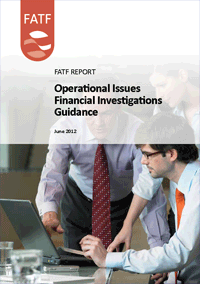Les Recommandations du GAFI sont destinées à détecter les activités financières illicites, protéger l’intégrité des systèmes financiers, poursuivre les criminels en justice et prévenir des menaces contre la sécurité nationale. Les enquêtes financières sont l’un des éléments essentiels de la lutte contre le blanchiment de capitaux et le financement du terrorisme. Afin que ces enquêtes soient efficaces, un pays doit disposer d’un cadre opérationnel qui fonctionne bien : les autorités de poursuite et d’enquête doivent disposer des compétences et des pouvoirs nécessaires et un cadre pour la coopération avec les partenaires nationaux et les homologues internationaux doit être en place. La GAFI a développé des lignes directrices pour aider les pays à prendre conscience de l’importance du rôle des autorités de poursuite dans les enquêtes sur le blanchiment de capitaux, le financement du terrorisme et le traçage des avoirs. Elles présentent également des stratégies et techniques permettant d’aider les pays à améliorer l’efficacité de telles enquêtes.
Document disponible en anglais et en russe uniquement.
The purpose of the Financial Investigations Guidance is to help countries better understand law enforcement’s role in the larger anti-money laundering/countering the financing of terrorism (AML/CFT) context, specifically addressing the role of financial investigations. This guidance report aims to assist policy makers as well as practitioners by providing ideas and concepts that they can incorporate into their AML/CFT frameworks that might lead to more effective financial investigations.
The term financial investigation, for the purpose of this guidance report, means an enquiry into the financial affairs related to criminal conduct. The major goal of a financial investigation is to identify and document the movement of money during the course of criminal activity. The link between the origins of the money, beneficiaries, when the money is received and where it is stored or deposited can provide information about and proof of criminal activity.
During the latest revision of FATF Recommendations, greater attention was given to the operational AML/CFT framework. One goal was to strengthen the law enforcement standards (Recommendations 30 and 31) to enhance the functions, responsibilities, powers and tools of law enforcement to effectively conduct money laundering, terrorism financing and asset-tracing investigations. The revised standards now recognise financial investigations as one of the core elements of the FATF’s operational and law enforcement Recommendations.
Before any of the requirements of the FATF Recommendations can be implemented by operational authorities, a comprehensive legal framework is necessary to underpin these requirements, and the use of investigative techniques can only be applied if they are permitted by and within the possibilities of the basic principles of a country’s domestic legal system. This guidance report will highlight elements of the Palermo Convention which are necessary to implement many of the law enforcement powers and techniques described in this guidance.
This guidance report also contains overarching concepts, strategies and techniques which are meant to be applicable to different legal systems and different types of operational frameworks and is intended to assist countries on how best to implement the FATF Recommendations associated with conducting financial investigations. This guidance will highlight areas where training and technical assistance for financial investigators and prosecutors can be sought but is not to be viewed as a training manual on financial investigations. Throughout the document references are made to information that provides further detail on financial investigation
Some of the ideas and concepts provided in the guidance go beyond the scope of the standards but are intended to provide examples of ways in which countries conduct financial investigations.


 Twitter
Twitter
 Facebook
Facebook
 Instagram
Instagram
 Linkedin
Linkedin
